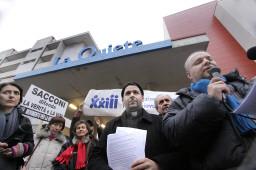The government on Thursday scrambled to prepare a draft emergency decree to stop doctors carrying out a landmark right-to-die court ruling that is fiercely opposed by the Catholic Church.
The draft contains a single measure that would effectively prevent doctors from removing 38-year-old Eluana Englaro's feeding tube in accordance with a supreme court ruling.
''Nutrition and hydration (artificial feeding), as forms of vital and physiological support targeted to alleviate suffering, cannot be refused in any case by (patients) or suspended by people assisting patients who are not in a position to take care of themselves,'' according to the decree.
Eluana, who has been in a permanent vegetative state for 17 years, was transferred on Wednesday to a clinic in Udine that has offered to help her die.
Earlier on Thursday Health Undersecretary Eugenia Roccella said the government was doing all in its power to stop doctors on Eluana's medical team, who plan to begin halving the amount of food and water Eluana receives on Friday morning.
After three days of decreasing her nutrition, doctors will remove her feeding tube. They expect it will then take Eluana around two weeks to die.
''It takes a long time to let a person die by removing food and water, but after four days the dehydration produces irreversible damage. We have very little time left (to stop this),'' Roccella said.
Lawyers for the Englaro family said the government decree would be ''constitutionally abnormal, unheard of in (the history of the) Italian republic'', but admitted that it would ''block everything''.
''I cannot allow the doctors to become involved in committing a crime,'' said Giuseppe Campeis.
Beppino Englaro has been fighting for more than a decade for a dignified end to his daughter's life in accordance with what he says would have been her wishes.
GOVERNMENT MULLING OVER OPPOSITION TO DECREE.
Parliamentary sources said the government was still reflecting on whether to move ahead with the draft decree, which has already come under heavy fire from opposition politicians.
Observers believe that President Giorgio Napolitano, who would be required to okay the decree, is likely to have doubts on the issue.
Napolitano has stressed repeatedly that the way to deal with cases such as Eluana's is through parliament passing a law on living wills, which allow people to stipulate what medical treatment they want in the event they later become unable to make a decision themselves.
There is currently no legislation governing living wills in Italy, where the topic is also strongly opposed by the Catholic Church.
The draft decree was backed by politicians from the centrist, opposition Catholic UDC party, but Walter Veltroni, leader of the centre-left Democratic Party (PD), said that such a ''major'' political intervention would be ''unacceptable''.
''This is a very delicate issue on which I believe politics should take a step back and let things be determined by just two objective factors: the parents' love for Eluana and the court rulings,'' Veltroni said.
Communist Refoundation party leader Paolo Ferrero went further, saying the draft decree made Italy seem like ''an Ayatollah's state''.
''The government's attempt to prevent the sentence being carried out and an end being given to a 17-year odyssey via an emergency decree is simply insane,'' he said.
''Politicians should shut up and allow Eluana die in peace, surrounded by the love of her close family,'' he added.
The PD's Barbara Pollastrini meanwhile said that an emergency decree preventing the sentence from being carried out would ''inevitably open a conflict'' between parliament and the judiciary.
If the decree is passed, it will be the second time since November's court ruling that the government has blocked a clinic from helping Eluana end her life.
Health Minister Maurizio Sacconi prevented Eluana from being transferred to another clinic in Udine that offered its services in December by issuing a last-minute guideline that stated the removal of feeding tubes from patients in a vegetative state was ''illegal''.
In a poll by weekly magazine Panorama last week, 58% of people said medics should remove Eluana's tube, while 30% believed treatment should be continued.
There are currently between 2,000 and 2,500 other people in vegetative states in Italy.









